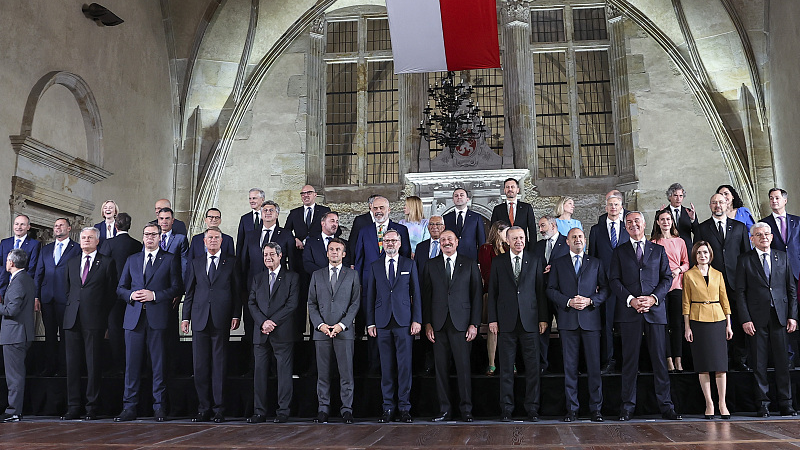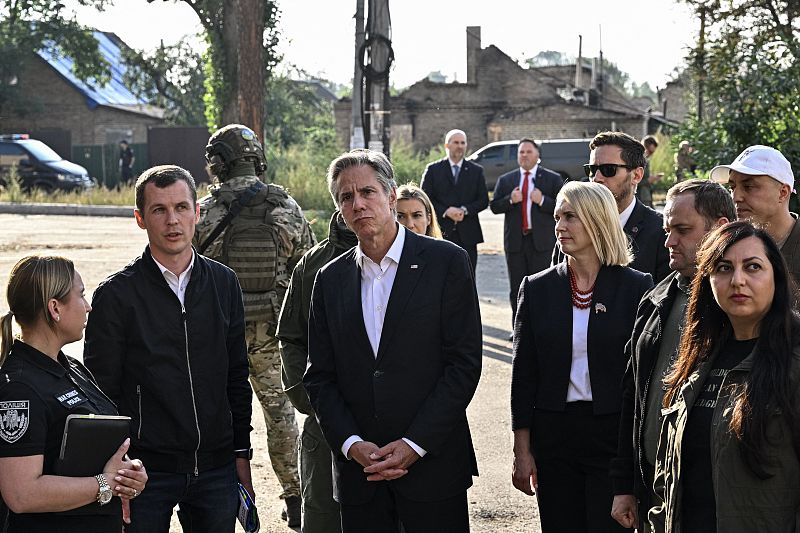
A group photo of leaders of countries at the first meeting of the European Political Community (EPC) in Prague, Czech Republic, October 6, 2022. /CFP
A group photo of leaders of countries at the first meeting of the European Political Community (EPC) in Prague, Czech Republic, October 6, 2022. /CFP
Editor's note: Keith Lamb is a University of Oxford graduate with a Master of Science in Contemporary Chinese Studies. His primary research interests are China's international relations and "socialism with Chinese characteristics." The article reflects the author's opinions and not necessarily the views of CGTN.
The European Political Community (EPC) meeting, held in Prague and proposed by French president Emmanuel Macron, has led some to question whether Europe is on the road to strategic autonomy. By looking at the circumstances surrounding the "in-formation" EPC, its aims, and Europe's current conditions the answer, in any near or medium timeframe, is simply that Europe has near to little room for maneuver.
The very timing for the proposed EPC suggests that, in the ideological realm, Europe's strategy has been captured by the U.S. It has arisen in the context of the Russian-Ukraine conflict, which has been spurred on by NATO, which acts at the behest of U.S. interests, not European ones. Consequently, the EPC acts as an anti-Russian talking shop while simultaneously giving the impression of EU expansion without actually admitting new members.
The EPC meeting in Prague includes 44 European states with 27 of them being EU members. Important non-EU invitees include the UK, Turkey, Armenia, Azerbaijan, Georgia, Moldova and Ukraine. Invites have gone out to countries based on possessing "European values" and sharing the European continent.
However, what are European values? Ukraine has long had far right forces within its army and politics. It's not hard to see how their world-view conflicts with multicultural Western Europe or Islamic Europe. In terms of "sharing the European continent," Russia, which is the largest and most populous country in Europe, is not invited.
This suggests that the EPC is formed out of the ideology of trans-Atlanticism, which will forever seek to subvert Russia to Western Europe, which is, in turn, subverted to the U.S. hegemonic interest of preventing the rise of an interconnected and independent Eurasia.
The EPC talking points are "security and peace, energy, climate, and the economic situation." These all relate to the conflict in Ukraine which threatens the destruction of Europe if not the world. Not allowing European nations to source their gas independently will lead to their economic decline. Greater reliance on more polluting fossil fuels, to plug the energy deficit, will wreck Europe's environment.

U.S. Secretary of State Antony Blinken visits Irpin, Ukraine, September 8, 2022. /CFP
U.S. Secretary of State Antony Blinken visits Irpin, Ukraine, September 8, 2022. /CFP
Considering the U.S. aims to fight Russia "to the last Ukrainian," while throwing the European economy and the livelihood of its people under the bus, speaks volumes about where the real danger for Europeans who value peace and prosperity is coming from. Europeans must wake up and think of their own interests which cannot be separated from the Eurasian continent.
Europe's political systems have been subverted to the needs of the U.S. and in the ideological realm, this is the case too. Europeans have been conditioned to moan about Chinese tech while simultaneously they blindly accept no European equivalent to basic modern tech resources like Amazon, Facebook, and Google, which means Europeans' basic modern infrastructure, their retail, their personal information, their media, the means of surveillance and many more aspects of their daily reality are conditioned by the interests of trans-Atlantic global capital specifically residing in the U.S.
Under this status quo, European states are nothing but neo-colonial vassals of the U.S. empire. They have their own flags but they are caged. Previously, Europeans believed in their economic freedom because "the leash" was longer. However, Europe's economy has been brought to heel. No longer will Germany gain access to Russian gas. For the sake of Germany's "independence," it will be forced into limiting its supply and being dependent on buying more expensive and polluting U.S. gas.
This fate has been sealed with the destruction of the Nord Stream gas pipeline, which "coincidently" is to the benefit of the U.S. The vassal status, of European states, their servitude and their cowardice was prominently on display by their silence.
Under these current conditions, in the short to medium term, the EPC can hardly be a force for European strategic autonomy because its anti-Russian aims are narrow and it doesn't represent all of Europe. First, when it comes to European values, many of the EPC invitees are at loggerheads.
Second, when key players in Europe, such as the strongest state Germany, are beholden to the U.S., when Europe is set to economically decline, when no one will even speak up, and when most are slumbering in ignorance, what capacity does Europe have for strategic autonomy?
At best the choices for Europe's strategic action will be limited by non-Europeans. Certainly, the much-needed strategic decision to reach a lasting peace in Europe and achieve economic autonomy is presently off the table. If it does go on the table, then interests outside of Europe will bring their hard power into play to keep the European colony in servitude.
(If you want to contribute and have specific expertise, please contact us at opinions@cgtn.com. Follow @thouse_opinions on Twitter to discover the latest commentaries on CGTN Opinion Section.)